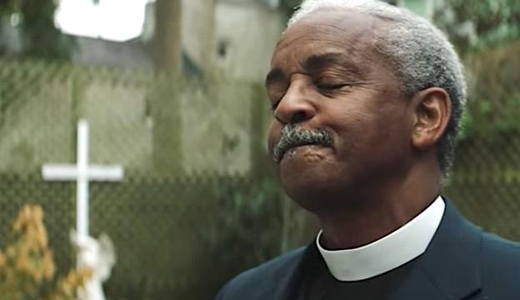Plugged In sometimes compares good media discernment with a good diet: We are what we eat. We consume movies like we might a salad or a piece of cheesecake. And who we become is, in part, a reflection of the entertainment we consume: If our diet is all junk, we’ll feel it and show it.
But sometimes, we encounter what seems like the movie equivalent of your veggies: Films that might be good for us, but we’d just assume skip.
I think that’s why documentaries can be such a hard sell. They might be great movies in reality. But when we first see a poster or watch a trailer for them, they can sometimes feel like broccoli for the mind.
I was thinking about this a bit while watching Emanuel, the challenging, deeply moving and ultimately inspiring documentary that’ll be in theaters (courtesy Fathom Events) June 17 and 19.
The movie, helmed by Brian Ivie (who also directed the film Drop Box) deals with one of the most painful moments in recent American history: the 2015 shooting at Charleston’s Emanuel African Methodist Episcopal Church. Dylann Roof, a 21-year-old white supremacist, walked into the church before an evening Bible study on June 17 that year, pulled out a gun and killed nine people.
“He sat through the whole Bible study,” survivor Felicia Sanders says in the movie. “And when we closed our eyes to pray, that’s when he lit up the room.”
Sanders was just one of three people to survive that night. Roof, who had hoped to spark a race war, left behind a horrific scene—made all the more horrific, I think, because of where it was done. While we’ve been forced to become sadly calloused to tragic mass shootings in recent years, this felt all the more terrible because it took place in a church. To shoot people at a Bible study? As they prayed? A monstrous act became even more monstrous because of the context.
Ivie doesn’t take his cameras into the church on that terrible night. We don’t see police photos of the scene or images of the victims. The closest Ivie gets to the church on June 17 is security footage of Roof casually walking in and, later, casually walking out. But through the stories of survivors and grieving family members, audiences know, painfully, what happened. They feel the horror and grief and loss of that night—just as a good documentary should help us feel.
It’s not easy stuff to sit through. Nor are Emanuel’s other fleeting scenes of real-world violence—including footage of a police officer shooting a fleeing man several times in the back. At Plugged In, we often point to Philippians 4:8 as a motivating verse in our mission: “Finally, brothers, whatever is true, whatever is honorable, whatever is just, whatever is pure, whatever is lovely, whatever is commendable, if there is any excellence, if there is anything worthy of praise, think about these things.” And many of the elements we face in Emanuel just don’t qualify.
But the truth is (and as Philippians’ author Paul knew), the real world is sometimes not lovely or honorable or even just. It can be ugly and horrible and utterly perplexing. And often, documentaries show us that world. A world we don’t always want to see or hear about or experience. So, like broccoli, we tend to push these hard docs dealing with hard subjects away.
But here’s the thing: Emanuel, ultimately, isn’t about the tragic act the killer committed on June 17, 2015. It’s about what came after.
During a bond hearing less than 48 hours later, Roof stood in an orange jumpsuit to hear the charges against him. He faced some of the other victims of the shooting—the grieving family members he robbed of their mothers, sons and spouses.
As viewers of Emanuel, we know how much they’ve suffered. And that’s what makes what happens next so remarkable: Many of the grieving stand up, look at Roof and … forgive him.
“I forgive you,” said Nadine Collier, who lost her mother in the attack. “You took something very precious from me. I will never talk to her again. I will never, ever hold her again. But I forgive you. And [God] have mercy on your soul.”
She wasn’t unique. Others expressed forgiveness as well. They followed the example set by their Savior—to show mercy on someone who didn’t deserve it. And in so doing, they not only helped keep Charleston from exploding into racial violence, but offered a deeply poignant example of the faith that Emanuel, the church, stood for.
Whatever is true, honorable, lovely, commendable, just … think about those things, Paul said. Some in Emanuel argue that the forgiveness shown by some of these survivors circumvented real justice and cut short an overdue conversation on racism in Charleston. But in my opinion, the actions shown by Nadine and others is honorable, lovely and marvelously commendable. It points to a truth we so often overlook in these shrill and angry times: That sometimes the best way forward is by showing mercy and grace. When we show love—even when that love is undeserved—it opens hearts up to conversation and reflection. It opens us up to change. Just as Jesus knew when He forgave us our sins, too.
Emanuel is, at times, a difficult film. We might be tempted to let this dish pass us by. But sometimes, difficult movies can be beautiful, too. And we’re the better for them.
Emanuel will be in theaters June 17 and 19.






Recent Comments